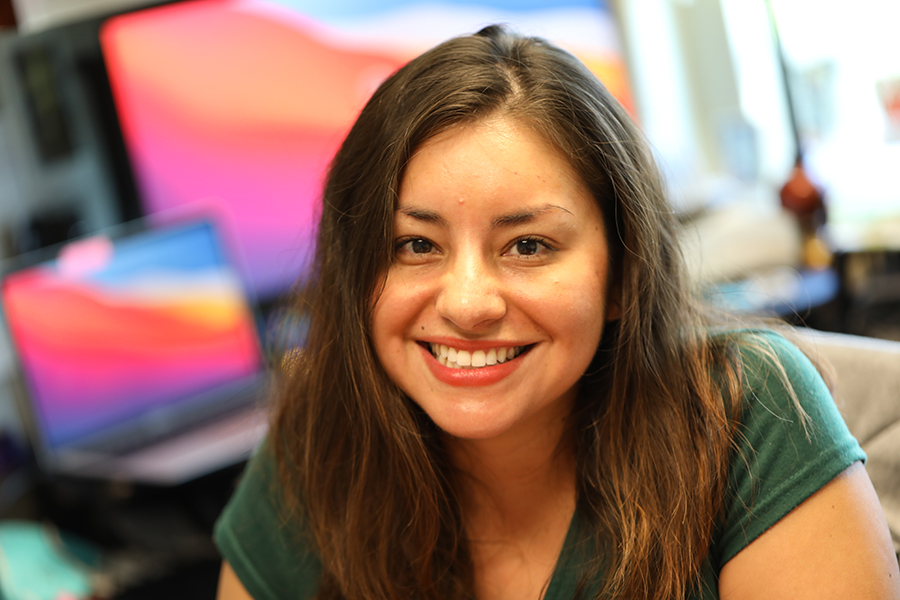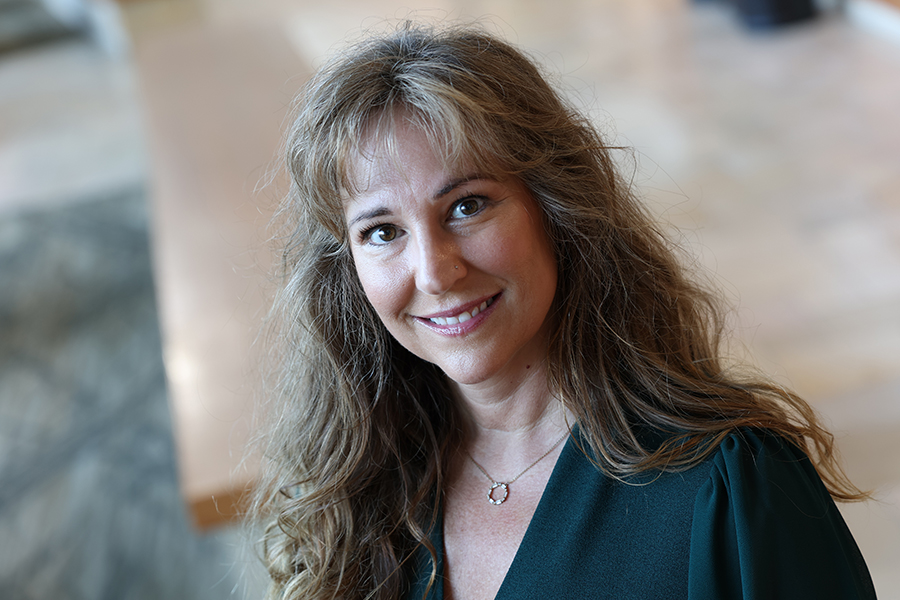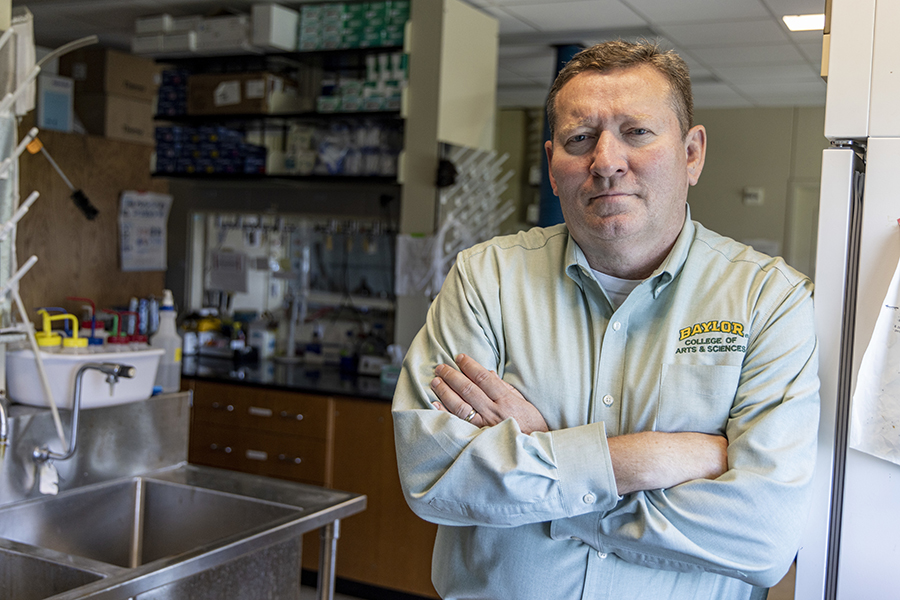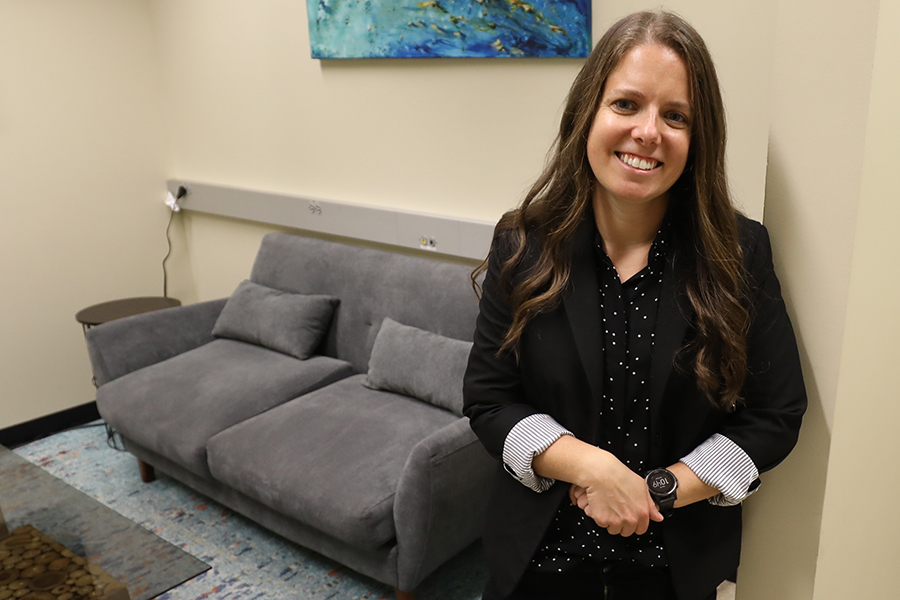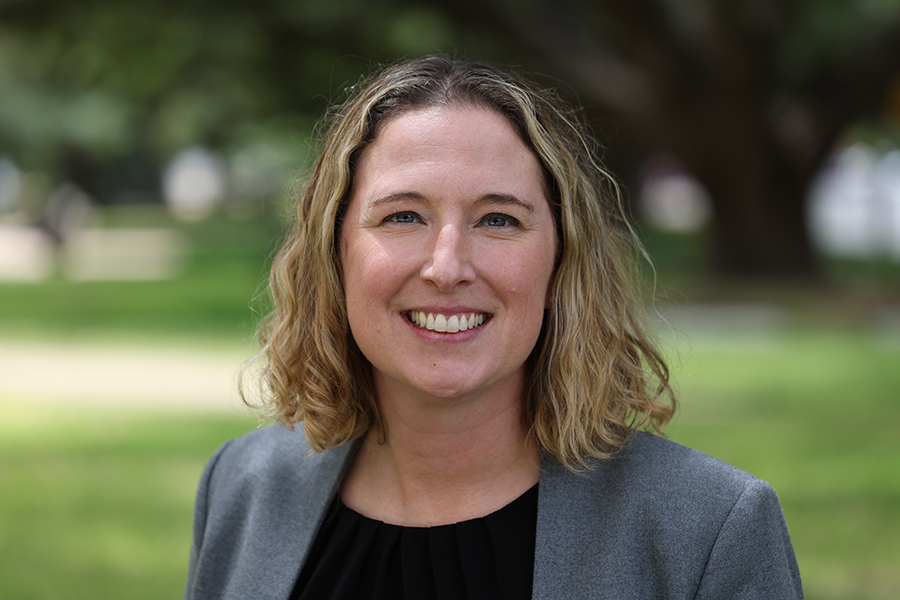Learning from Those Who Have Gone Before
Arts & Sciences faculty who were first-generation students are inspiring the next generation
Every new student who steps on the Baylor campus for the first time has some basic challenges to overcome, such as learning to manage their time effectively, acquiring new study skills and making sure to take care of themselves as they complete their academic assignments. But first-generation students — those students who are the first in their family to seek or complete higher education — encounter even more challenges than these.
“First-generation students are having to figure out how to navigate the societal structures around higher education,” said Michelle Gonzalez (BA ‘12), program manager of student success for Baylor’s First In Line program. “Their peers might be legacy students, but first-generations might not have that same networking built in, have that same kind of support.”
Of the first-gen students who complete higher education degrees, a number of them go on to choose educational careers that take them back to a college or university. At Baylor right now there are about 2,500 first-gen students — and more than 300 faculty members who were either first-generation students themselves, or who choose to play significant roles in supporting first-gens.
Baylor’s First In Line program provides resources to first-generation college students to support their success at Baylor and beyond. Gonzalez and her staff have the charge to “support and empower and celebrate our first-generation community,” including faculty members who were once first-gen students themselves.
“When our first-generation students find faculty members who are first-generation graduates, that’s a really special connection, because students know that they’ve got a safe space,” Gonzalez said. “They know that this professor knows what the journey is like and what unique challenges come with following the first-gen path.”
Each journey taken by a first-generation student to become a faculty member at a college or university is different, so we asked six first-gen faculty members in the College of Arts & Sciences to share their stories. ›
Dr. Karenna Malavanti
Senior lecturer in psychology and neuroscience
Karenna Malavanti (BS ’10, MA ’12, PhD ’14) was going to college. Her mother insisted, and there was no question about it. But there were going to be challenges, since Malavanti was not only a first-generation college student, but also a first-generation American.
Her mother, Nelly Nuñez, was born in Ecuador and came to America when she was a teenager. She worked as a telephone operator for AT&T in New York and was transferred to San Antonio. Because of her experiences at AT&T, Nuñez knew that her daughter needed to graduate from college.
“I think my mother knew how hard her life was, and how different her supervisors’ lives were,” Malavanti said. “She could see very early on that she wasn’t going to be moving up into management, she wasn’t going to be moving up into those big offices. She was going to stay a telephone operator because she didn’t have a college degree — she was just a high school graduate. It provided steady income, provided lots of flexibility, which was fantastic. She was always home when we needed her, but she worked flex, two shifts during the day. And she did what she had to do to give us opportunities. I will always be grateful for the way that she sacrificed for our family.”
“Some first-gen students do reach out to me… I love having those discussions, because I remember what it was like.”Dr. Karenna Malavanti
Nuñez got to know her daughter’s counselors and vice principals at Madison High School in San Antonio, “and I think that that was very helpful, because they are the ones that guided me through the scholarship process, the application process, even the interview process at some institutions,” Malavanti said. “She was humble in that way. She knew that she couldn’t help, but she got me connected to the people who could.”
Malavanti chose to attend Baylor University because it “put together a very appealing scholarship package, including some endowed scholarships, because I was a National Hispanic Recognized Scholar,” she said.
Once at Baylor, Malavanti quickly became involved in Gamma Alpha Omega, a small Latina sorority, and the Hispanic Student Association. And she met people in psychology and neuroscience, including Dr. Chuck Weaver, the department chair at the time and now an associate dean in the College of Arts & Sciences. It was Weaver’s Cognitive Psychology class that prompted her to switch from a biology premed concentration.
“That’s the one that just came alive to me,” she said. “I couldn’t stop thinking about it. And I realized, ‘Hey, this is what I should be doing with my life.’”
Malavanti went on to earn three degrees from Baylor — a BS in neuroscience, an MA in psychology and a PhD in experimental psychology. She joined the Baylor faculty in 2017 and is upfront with her students about her path to college, telling them on the first day of class that she is first generation.
“From the get-go, on the first day of class, and on the syllabus, I just let them know that this is part of my identity,” she said. “And some first-gen students do reach out to me early on in the semester, like, ‘Oh, my gosh. You’re first-generation? Me too.’ And we talk about it. I love having those discussions, because I remember what it was like.”
Dr. Moisés Park
Associate professor of Spanish
When Moisés Park graduated from high school in Santiago, Chile, it was just assumed that he would pursue a degree in medicine. “First-generation students only know a few careers,” he said, “so the most common jobs would be the ones that my parents would recognize.”
Park’s parents graduated from high school in their native South Korea, but didn’t meet until after they both moved to Bolivia. To support their family, the couple worked in a variety of industries, including furniture, clothing and curtain manufacturing, picture framing, large-format printing and eyeglass lens sales. Even though neither parent continued their education after high school, for Park, “college was a must, in part because the Korean diaspora really understood that to be able to be stable in a place and have roots and flourish was through an academic route,” he said.
“I purposely try to detect first-gen students who need resources and other social and emotional support.”Dr. Moisés Park
For Park, that academic route took him to the University of Michigan, Ann Arbor, “the most expensive public school in the world, for out-of-state students especially,” he said. “I ended up going to a state school and paying full out-of-state tuition — not knowing, for instance, that a lot of schools don’t give scholarships to international students. That’s related to my first-generation experience. If I had chosen to go to a private university or liberal arts school, I would have had better chances at applying for scholarships and grants.”
At Michigan, Park was a pre-med student, and to de-stress from his chemistry classes he would take literature courses in both English and Spanish.
“I had the nostalgia of wanting to hear my other mother tongue. I interacted with a lot of Korean Americans and Koreans in Michigan, but I needed to hear Spanish,” he said.
As Park neared graduation from Michigan, one of his literature professors, Hugo Moreno, a first-generation Mexican American professor, suggested that Park might want to pursue a graduate degree in literature. He did, going on to earn a PhD in Spanish from the University of California, Davis. After teaching at Gordon College in Wenham, Massachusetts, for six years, Park joined the Baylor faculty in 2016 and was recently granted tenure.
In his time at Baylor, Park has mentored several first-gen students, whom he said often tend to gravitate toward faculty members who are first-gen themselves.
“I purposely try to detect first-gen students who need resources and other social and emotional support that other students already know about. For instance, when I know some students are thinking of graduate school, I offer recommendation letters — a worry that first-gen students often have,” Park said. “As Baylor continues to grow as an R1 institution, we must continue to address these and other needs our first-gen students have.” ›
Dr. Jacquelyn Duke
Senior lecturer in biology
The topic of college didn’t come up much around the Duke dinner table when Jacquelyn Duke (MA ‘02, PhD ‘06) was growing up. Her father was a general contractor and her mother was a bank teller, but neither graduated from college. Duke wasn’t really prepared to navigate her way through higher education.
Her first attempt to get into college — at Baylor University — didn’t go so well. She was 18 years old and had just graduated with 11 other seniors from Utopia High School, which is about halfway between Kerrville and Uvalde in South Texas. Duke told a Baylor admissions counselor that she would get a parttime job to pay for her school.
“She said, ‘We charge $400 a credit hour. One class is over $1,000. I recommend you go to a community college,’” Duke said.
“[First-gen students] face challenges similar to those I did when I first started my college career.”Dr. Jacquelyn Duke
Thinking her Baylor dream was over, Duke did spend a semester at McLennan Community College. When her sense of adventure eventually took her to California she also spent some time at schools in Stockton and Modesto. Duke was working at Lawrence Livermore National Laboratory and taking classes as she could, and her employer even offered to pay for college if she would continue working in the lab after graduation. But she graciously declined.
“I didn’t want to do that,” she said. “I wanted to do biology.”
Even though Duke knew she wanted to do something in biology, she didn’t have much of a focus until she read the book “Silent Spring” by Rachel Carson for a politics and environment class at California State University in Stanislaus.
“It changed the trajectory of my life,” she said. “It led to Earth Day, it led to the formation of the EPA, several water acts, soil acts. Carson created the snowball of the environmental movement. That’s where I finally found my niche. I knew this was what I wanted to do in my life — study human impacts, humans and our place in nature.”
Duke’s passion for biology — as well as her expertise in stream ecology and freshwater ecosystems — were all fueled by the Texas landscape where she grew up.
“I spent all my free time out in creeks, exploring, building forts made from tree branches. All of my downtime was spent in nature on the ranch,” she said.
Duke earned her bachelor’s degree from Cal State Stanislaus when she was 28, while her master’s degree and PhD are both from Baylor. Since joining the Baylor faculty in 2006, Duke has made it a priority to mentor first-generation students.
“In some ways, they face challenges similar to those I did when I first started my college career. While today many of them have wonderful high school counselors who help them navigate how to prepare and apply, I think first-gen students lack having close relatives to assist them in getting the most out of visiting schools, asking pertinent questions, moving into dorms, and navigating the balance between schoolwork and extracurriculars,” Duke said. “As a first-gen student, I also missed a lot of the social opportunities of college because I was unaware of them — I assumed that college was strictly a path to a career.”
Dr. Bryan Brooks
Distinguished Professor of Environmental Science and Public Health
Director of the Baylor Environmental Health Science Program
When Bryan Brooks was a senior at the University of Mississippi, he took an aquatic biology course with Stephen Threlkeld, whom he describes as “a world-class aquatic scientist.”
Brooks had been planning to attend optometry school after earning his undergraduate degree, but that aquatics course “opened up a whole new world to me,” he said. Brooks began working on research with Threlkeld and a PhD student, Bob Baca, and ended up staying at Ole Miss for a master’s degree, with Threlkeld as his mentor.
“I’ve tried to help any way I can…just to assure first-gen students that, ‘Hey, I’ve been in the same position.’”Dr. Bryan Brooks
From there, Brooks began work on his PhD at Texas Tech University under Tom La Point, then finished at the University of North Texas, when La Point was appointed director of the Institute of Applied Sciences there. La Point replaced Ken Dickson, who was stepping down as director but remaining at the university, which gave Brooks a chance to work with him and Tom Waller as well.
“I’m just grateful, because what I found is that professors invested in me from the undergraduate level, and that took me on this path to discovery,” Brooks said. “So, when I came to Baylor in the in the fall of 2002, it was really easy for me to develop a real strong bond with Baylor because of our commitment to intentional integration of undergraduates into research, and investing in students.”
Brooks grew up in California, where his father worked in forestry and took a few community college classes as he could. His mother worked as a bookkeeper for a time, but was primarily a homemaker. Neither of Brooks’s parents graduated from college, which made navigating his own way to and through college a challenge at times.
The advisor at Brooks’ high school in Belmont, Mississippi — population 2,290 — told students with good grades that they could go into business, education, accounting, engineering, law or medicine.
“I don’t feel like I really had very good advising,” Brooks said. “I did have some wonderful teachers in that school, and I had some good friends. And we went on, and we persevered, and we made it through.”
Though Brooks did not get the kind of advice he wanted before college, he’s determined to make sure that Baylor first-gen students receive the support they need.
“I think about what all Michelle Gonzalez is doing with the First In Line program,” he said. “That’s one of the reasons why I’ve tried to help any way I can, and support that effort, just to assure first-gen students that, ‘Hey, I’ve been in the same position.’” ›
Dr. Annie Ginty
Assistant professor of psychology and neuroscience
Annie Ginty had an early advantage that many first-generation college students don’t. As an incoming student-athlete at Allegheny College in Pennsylvania, Ginty had a built-in community, support system and structure.
“You instantly have a community that you’re with every single day,” Ginty said. “You have a coach telling you that you need to achieve. Your days are structured because you have practice twice a day.”
Running cross country and track at Allegheny, Ginty competed in the Division III national championship cross country meet as a sophomore.
“I’ve found some really great opportunities to work with students and mentor them.”Dr. Annie Ginty
Ginty grew up in Cleveland, Ohio, and her father was an Irish immigrant who worked in construction. Her mother, a first-generation American with Irish immigrant parents, was an office assistant. Ginty went to an all-girls Catholic high school that was run by nuns.
“It was a pretty rigorous high school, and I had a biology teacher who spent a lot of time teaching us about the connection between the brain and how it impacts the rest of your body, which was really awesome to learn in high school,” she said. “I realized that that was what I wanted to study.”
Ginty had her sights set on medical school until a chance encounter with a Baylor graduate during her junior year of college. Sarah Conklin, who earned her PhD in neuroscience at Baylor in 2005, taught one of Ginty’s psychology classes at Allegheny College.
“Dr. Conklin recognized I had a knack for research, and she encouraged me to pursue research,” Ginty said. “She talked more about her career trajectory and steps she did to get there. That made it more real, whereas if you have somebody teaching in front of you and they’re not saying how they got there, it never really makes sense. Before, I had people who taught me and they just ended up there somehow — I couldn’t see how I would get there.”
After graduating from Allegheny, Ginty earned her PhD at the University of Birmingham in the United Kingdom. She stayed there for a two-year fellowship, completed another postdoctoral assignment at the University of Pittsburgh, then joined the Baylor faculty in 2016.
“When I visited the Baylor campus, I just fell in love with the idea that I could do my research and mentor undergraduates to assist with my research, while still doing it to that high caliber,” Ginty said. “And the fact that Baylor has such an emphasis on serving the community as well, it was kind of like everything I wanted to do meshed together.”
Ginty has not neglected to take the lessons she learned as a first-generation college student and share them with others.
“I’ve found some really great opportunities to work with students and mentor them in ways that I didn’t even know students would need mentorship, such as talking about career options, what to do in college to set you up for graduate school, and how to be the first one in your family to go to college,” she said.
Dr. Lauren Poor
Senior lecturer in history, Director of the Office of the Core
During her interview for admission to the boarding school Philips Academy-Andover in Andover, Massachusetts, Lauren Poor was asked to describe a family tradition. She talked about her family’s routine on Thursday nights, when they made pizza and watched NBC’s lineup of Must See TV.
The school’s admissions officer, Bill Leahy — “I’ll never forget his name,” Poor said — later told Poor’s mother that her daughter’s response “was so genuine, it was just clear who she is and what she’s about,” Poor said.
Other Andover students probably had much more elaborate family traditions, Poor said, as the school boasts alumni such as John F. Kennedy Jr. and both George H.W. Bush and son George W. — two U.S. Presidents. Poor’s Andover classmates included Jigme Khesar Namgyel Wangchuck, the current king of Bhutan, Anjali Sud, the CEO of Vimeo, and the actor Olivia Wilde.
Poor grew up as part of a large, extended Irish Catholic family in Boston. Her father was a police officer at Harvard University and her mother was a paralegal for many years.
“I was the first person in my family, and also my larger family, to get a college degree,” she said. “I come from a blue-collar family in Boston. I’ve got four uncles that are police officers, as well as a couple of firefighters. They’re a lot of people who take great pride in building up their careers and their livelihood without having a college degree.”
Poor was a “scholarship kid” at Andover, having played competitive club soccer since she was 10 years old.
“I always have the first-gen population in mind when I organize my courses.”Dr. Lauren Poor
“I kind of put all my eggs in that basket and loved it, and it opened some doors and it started that spark of finding other opportunities that I could follow to pursue my love of learning,” she said. “But I see a lot of my life, to this day, formed by the experience of being a first-gen student.”
After Andover, Poor earned her undergraduate degree in international relations and foreign policy at Tufts University near Boston, then added a master’s degree and PhD in history, both from Indiana University in Bloomington. She joined the Baylor faculty in 2012.
In her history classes at Baylor, Poor considers the needs of first-generation students. One way she responds to the challenges of first-gen students trying to adjust to college is by including details in her syllabi explaining the concept of office hours, the steps needed to declare a major, and the importance of keeping costs in mind when assigning textbooks.
“I always have the first-gen population in mind when I organize my courses,” she said. “I’m cognizant of the fact that they’re coming in here with not only preconceived notions about history, but they also realize there are many things they need to know — but aren’t yet aware of — to become a successful college student.”
